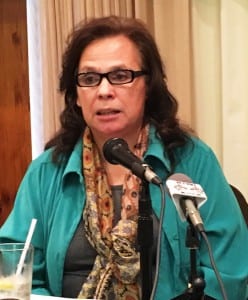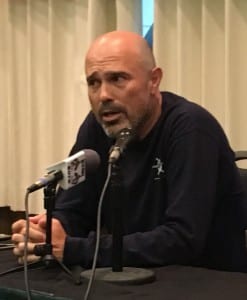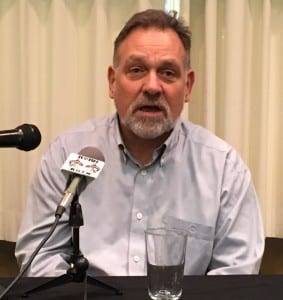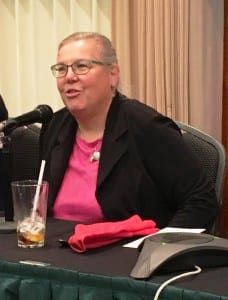Ketchikan Gateway Borough Assembly candidates answered questions for about 90 minutes on Wednesday during the regular Ketchikan Chamber of Commerce lunch.
Here is a summary of the event.
Five people are running for two open seats on Ketchikan’s Borough Assembly. They are Rodney Dial, Judith McQuerry, Susan Pickrell, Keith Smith and David Timmerman.
The seats are currently held by Bill Rotecki and Alan Bailey, but neither can run for re-election because of term limits.
Each candidate was given time for a quick self-introduction. Timmerman said he’s lived in Ketchikan about 25 years, is a former commercial fisherman, works for the city’s Port and Harbors Department and has been a Ketchikan School Board member for about seven years.
“I’ve grown to see a lot of the mechanisms within the borough assembly and the school board,” he said. “Part of the reason I’m running is to help with relations between those two bodies. Some people would accuse me of being one of the antagonists within that relationship. Part of that is, I’m brutally honest, I don’t mince words and I fight for kids.”
The Ketchikan School District is part of the borough government. The Borough Assembly
chooses how much local funding the schools receive – within certain parameters — and has limited review power over the district budget.
McQuerry has lived in Ketchikan about 37 years, and is the former director of the Ketchikan Public Library.
She said she’s running because she felt it was the right time to step up for public office. McQuerry said one main area of focus for her will be choosing the right borough manager to replace Dan Bockhorst, who is retiring at the end of the year.
Dial is a retired Alaska State Trooper. Speaking via telephone, he said he’s running because government isn’t listening to the citizens.
“If the citizens are against something, government does it anyway. If they’re for something, government doesn’t listen,” he said. “A few recent examples are Berth 3, Berth 4, White Cliff, the museum, consolidation…, to name a few.”
Several of those examples were City of Ketchikan projects, which would not be addressed by the Borough Assembly. Dial also expressed concern about city tax increases.
Dial noted that borough debt has gone up in recent years, and said citizens can’t afford projects that make living here more expensive. He said he would oppose any tax hikes, and said any new debt should go in front of voters for approval.
Pickrell is a lifelong resident, and has served previously on the Ketchikan School Board and the Ketchikan Indian Community Tribal Council. She works with elders at KIC.
Pickrell said the budget will be a huge issue in the coming years, and the borough needs a multi-tiered approach to plan for reduced revenue from the state. She said the borough needs to attract new business and support existing businesses.
Smith works for Southeast Alaska Independent Living. He’s lived in Ketchikan about 20 years, working primarily with various community non-profit organizations – including KRBD. He said he wants to provide thoughtful solutions for issues facing the borough.
The candidates were asked whether they would support a rule that all public projects costingmore than a million dollars must go in front of voters for ratification. Timmerman said public input is important, especially if projects are funded by local taxpayers. McQuerry agreed.
Dial said the public should be consulted every time, unless it’s an emergency.
Pickrell said public input is always important, and there are opportunities for that as elected bodies go through the decision-making process, but it isn’t efficient to have a public vote for every single project.
“I don’t know that I would commit to putting it to a ballot if it’s construction costs in excess of a million, every time,” she said. “Because elections and taking that to the public is expensive.”
Smith said such a rule could have unintended consequences of hamstringing government. He said he might support a measure that’s more fine-tuned and wouldn’t lead to expensive delays.
Another question focused on how to improve the local economy. McQuerry said the borough must be careful to not “slash and burn” its spending.
“It can feel like the right answer to just cut everything, and I think we need to be very, very careful about possible cuts and we need to be really mindful when we’re putting the budget together about what can be trimmed and what can’t,” she said.
 McQuerry said the borough should cooperate more with the City of Ketchikan to encourage local businesses, expand the tourism industry and support the shipyard. But, she said, Ketchikan is in good shape and she’d like to help that continue.
McQuerry said the borough should cooperate more with the City of Ketchikan to encourage local businesses, expand the tourism industry and support the shipyard. But, she said, Ketchikan is in good shape and she’d like to help that continue.
Dial said the local economy is in poor shape. He said local businesses have closed, and government has made it worse with high taxes. Pickrell said her biggest concern is that there aren’t enough job opportunities for young people.
Smith said property values and business assessments indicate the local economy is doing well, so the borough government needs to focus on providing incentives for businesses, and maintaining the quality of life in Ketchikan.
Timmerman agreed, and said tourism is up and the shipyard is filling the void left when the pulp mill shut down.
An audience member asked about the divide between the city and borough governments, and a later question dealt with consolidation. Dial said the two governments often deal with the same issues, and he’d try to work with the city to resolve them, but he doesn’t support consolidating.
Pickrell said many people confuse the borough and city, and maybe a borough charter would help clear that up. She said it’s up to the voters to decide whether to consolidate the governments.
McQuerry said the city-borough cooperative relations committee is a way for the two governments to try working together, and she’d work to maintain lines of communication. She supports consolidation.
Timmerman was a “maybe” on consolidating, and said that cooperation is vital, because much of the community’s economy is located within city limits. He hopes the next borough manager will be more willing to work with the city.
Smith said consolidation is something the community could explore again. He agreed that government-to-government relations have to be good.
“And so, I think as voters, they should really look for people that aren’t prone to getting in a pissing match and are ready to sit down and just have levelheaded conversations and find common ground that we’re all working together,” he said.
The candidates also were asked about ways to better include the City of Saxman, and they all agreed that was important. Candidates suggested attending Saxman’s Council meetings, and perhaps holding a Borough Assembly meeting in that community.
The five Assembly candidates were joined during the forum by Borough Mayor David Landis, who is running unopposed for re-election. We will have a separate story about Landis later.










